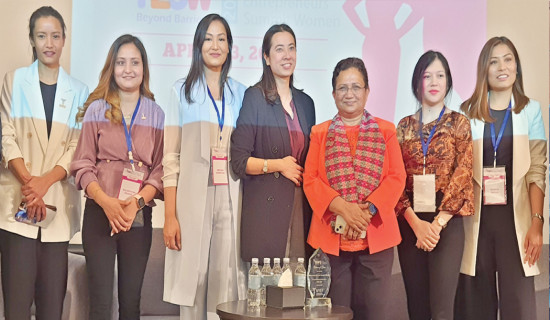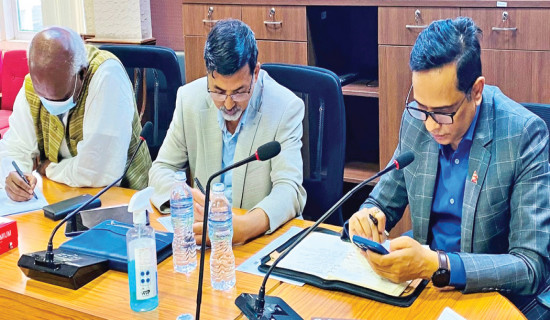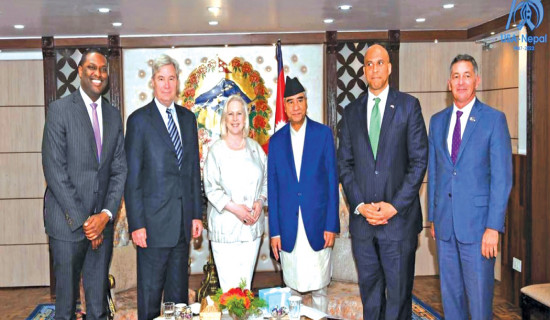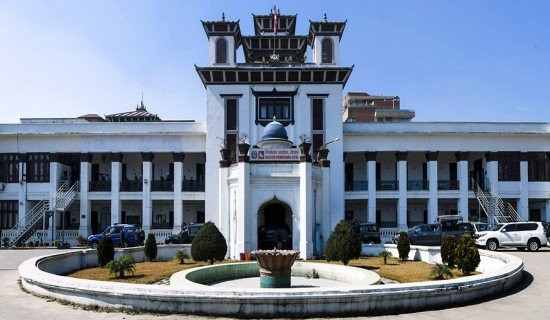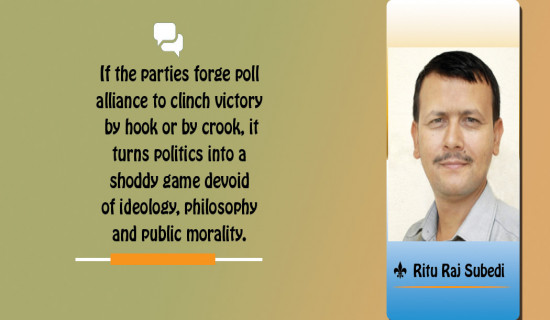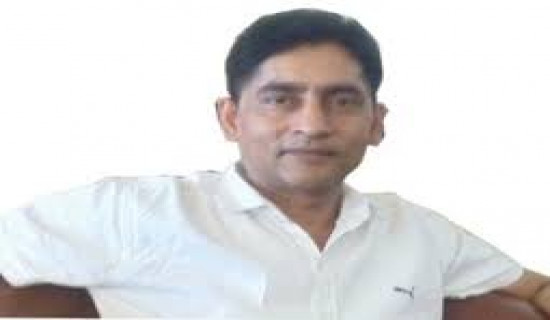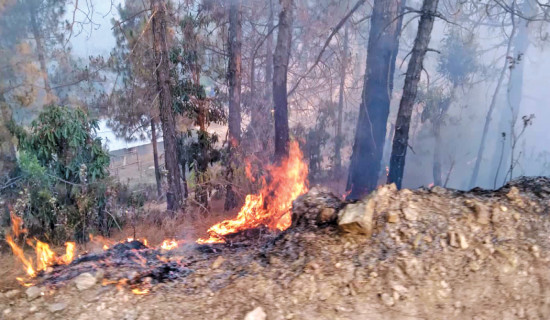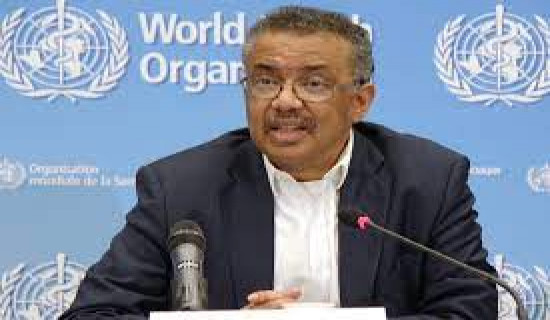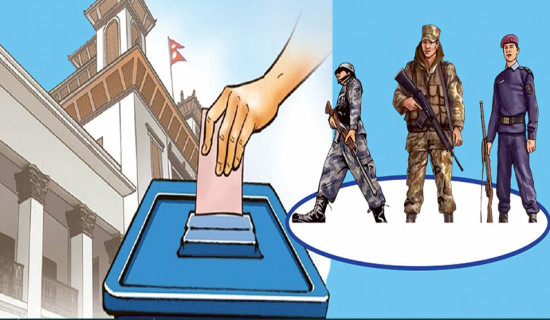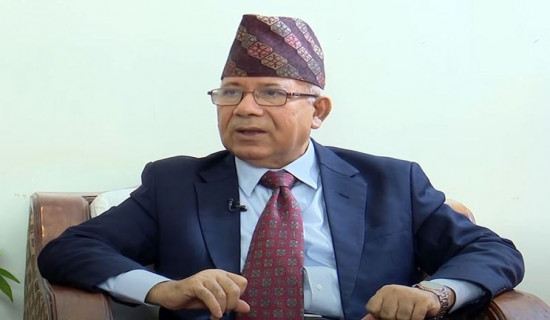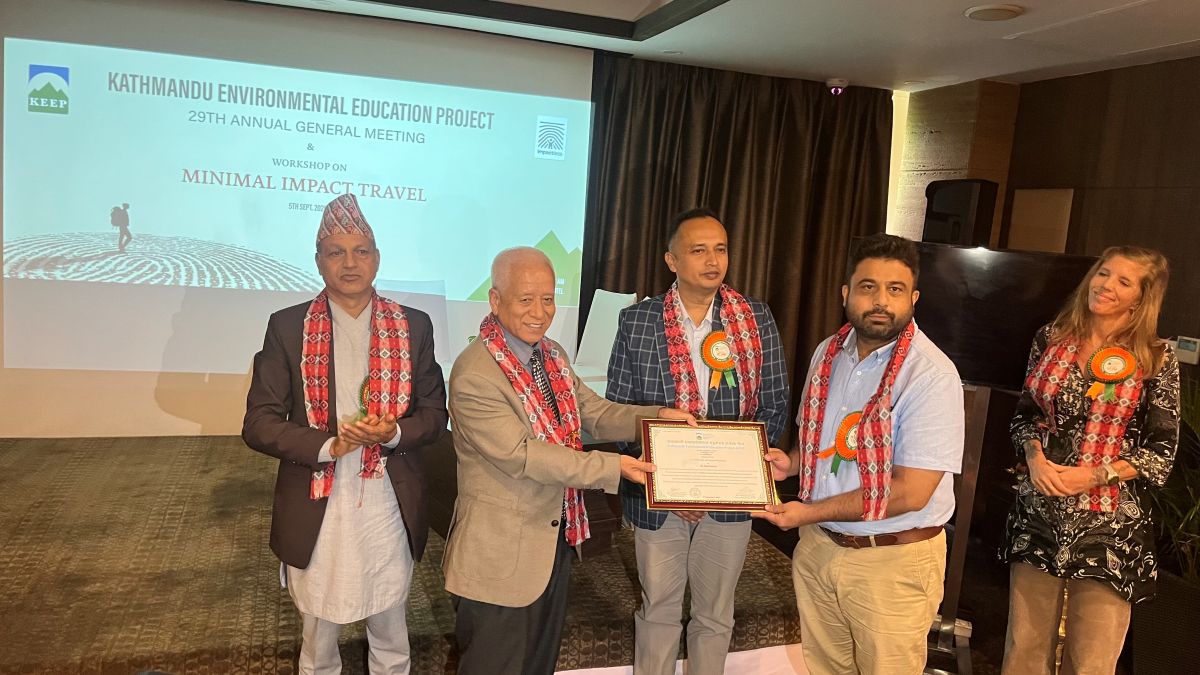- Friday, 5 September 2025
Minister Bhusal stresses young entrepreneurs' role in local levels
BY A STAFF REPORTERKathmandu, Apr. 24: Minister for Energy, Water Resources and Irrigation Pampha Bhusal has stressed on the need for young entrepreneurs to promote economic and social development.Inaugurating the 8th Women Entrepreneurs’ Conference organised by Nepalese Young Entrepreneurs’ Forum (NYEF) Saturday, she said that young entrepreneurs should be expanded to 753 local levels to engage the new generation in production.Minister Bhusal said, “It is a must to increase production to discourage imports and promote exports. For that, the youth of the country should be involved in production. ” She expressed the belief that the country would move forward on the path of prosperity as soon as the young generation is attracted to agricultural production.Stating that industrialisation, mechanisation and commercialisation should be given priority, Minister Bhusal said, "Young entrepreneurs should be involved in economic and social development."Women are lagging behind due to entrenched patriarchy, she said and stressed on the need for women entrepreneurs to be excellent not only in education and health but also in entrepreneurship.Stating that only when women and men have equal rights in the fields of politics, health, education and employment, a situation will be created where everyone can compete with all, said Minister Bhusal.Urging to engage in research and promotion for the expansion of agricultural production, she said, "The government will support the industry which is expanding agricultural productivity, not importing agricultural products worth Rs. 300 billion yearly."President of NYEF Udeep Shrestha said that they are committed to engage the youth in entrepreneurship.
Do not use term 'subsidy’ in agriculture: FM Sharma
BY A STAFF REPORTERKathmandu, Apr. 24: Finance Minister Janardan Sharma has suggested not providing subsidies for the agriculture sector in the budget of the coming fiscal year 2022/23.In a discussion with the Ministry of Agriculture and Livestock Development on Friday for the forthcoming policy, programme and budget Friday, Finance Minister Sharma suggested not to keep grants as the agriculture sector needs incentives."Do not use the word 'subsidy in agriculture' when making the budget for the next year, remove it," he said.He said that it was important to reward the farmers on the basis of increase in production, availability of improved varieties of seeds, timely availability of chemical and organic fertilisers, and encouragement of farmers through technology and technical assistance.Minister Sharma had given such instructions after Prakash Sanjel, Joint Secretary and Spokesperson of the Ministry of Agriculture, raised the issue of agricultural subsidy in the proposed programme for the coming fiscal year, said the Ministry of Finance.The Ministry of Agriculture, which has received a ceiling of Rs. 42.73 billion for the coming fiscal year, has said that it will propose agricultural programmes within the budget limit.According to the Ministry of Agriculture, only 2.5 per cent of the total budget has been allocated for agriculture in the current fiscal year and the average growth rate of the agriculture and livestock sector has been 3 per cent in the last ten years.During the discussion, Finance Minister Sharma had complained that there was a delay in setting up quarantine at the border despite repeated instructions. "In the previous meetings, we had said that we would release the budget immediately to set up quarantine at the border. But so far no preparations have been made. Do not delay further," he said.Minister Sharma has instructed to carry out quarantine tests on the quality of imported agricultural produce and food items, quantity of pesticides used, quantity of food or non-food, condition of labeling and so on.He has instructed to increase the production by distributing improved varieties of seeds to the farmers who are preparing to plant paddy in June-July."Distribute seeds of high yielding varieties of paddy to the farmers immediately. If some budget is needed for this, we will provide it," he said, adding, "Imports should be reduced gradually by increasing paddy production as soon as possible."Saying that agricultural commodities worth Rs. 325 billion have been imported in the first nine months of the current fiscal year, he said that there was no alternative to substitute imports by increasing agricultural production.During the discussion, Minister for Agriculture and Livestock Development Mahindra Ray Yadav said that adequate budget should be allocated for agriculture in the coming year as low budget is being allocated in the agriculture sector every year."Low budget does not increase agricultural production and export conditions. Therefore, the budget should be increased," said Minister Yadav.He said that there was a need to manage the Prime Minister Agriculture Modernisation Project and proper use of the investment allocated for this project. During the discussion, Agriculture Secretary Dr. Govinda Sharma informed that the productivity of summer paddy is more than 3 tonnes per hectare and that of Chaite paddy is more than 7 tonnes per hectare.Finance Secretary Madhu Kumar Marasini had directed to bring effective policies and programmes to ensure good returns in the agricultural sector.During the discussion, it was agreed to prepare a programme to increase the production of potato, onion, mushroom and vegetables.
CAN Infotech attracts young generation
By A Staff ReporterKathmandu, Apr. 24: The fourth day of IME Pay CAN Infotech 2022 witnessed a massive inflow of students and youths. The 27th edition of CAN Infotech, which started on Wednesday, was more crowded with government and non-government employees and students on Saturday than any other day.Those who came to the fair on Saturday said that they found out that the Infotech exhibition, which was postponed from January this year to now due to COVID-19 pandemic, offered many excitements in Information and Communication Technology sector. According to Nawaraj Kunwar, President of Federation of Computer Association of Nepal (CAN Federation) – organiser of the event, this year's Infotech is very different from the past events as people are searching for knowledge and skills to make the use of information and communication technology more systematic and more effective in the post-pandemic scenario. Branding, fintech and startups are more popular than ICT accessories, he said. According to him, there is a significant participation of observers in products including robotics, emerging technology, WiFi and internet. Stalls of software, networking and cloud solutions, electric and electronics, security solutions, laptop and desktop computers, printers, antivirus and banking solution software were also crowded with observers.Vice President of CAN Federation and coordinator of the event, Ranjit Kumar Poddar informed that thousands of people have come to Infotech by buying tickets daily through IME-Pay, instead of buying physical ticket at Rs 100. Popular singer Sushant KC, rapper Giris Khatiwada, singer Swapna Suman, PUBG player Indu Malla and other celebrities were present at the exhibition on Saturday. Dish Home has unveiled a new product 'Campus WiFi' on the occasion. The exhibition attracted the attention of the observers at the first-ever Mobile Information Access Center available in the country. The facility was developed by the Nepal Academy of Science and Technology (NAST) with the support from Korean government. According to Dr. Rabindra Dhakal, Head of the Faculty of Technology at the NAST, the IT-friendly bus has been developed targeting the areas and groups that do not have access to information technology and it has been exhibited for the information of the public.Necessary facilities like WiFi, laptop, projector, screen, electronic podium, printer, visualizer, sound system, speaker, toilet etc. are available for the students inside the air-conditioned bus. The ICT mobile bus is designed to accommodate 18 passengers at a time.The NAST aims to reach the rural areas of the country through a mobile bus and help bridge the gap between the educated and the uneducated in the field of ICT. Narayan Thapa, General Secretary of CAN Federation, said that CAN and NAST will work together to increase the training programme within NAST's bus for students and other curious people deprived of urban facilities through mobile information access centers with trainers up to local level in all 7 provinces with transportation access through its network in 74 districts outside the valley.The exhibition will run till Monday.
US Congress delegation calls on PM Deuba
The United States congressional delegation led by Senator Kirsten Gillibrand paid a courtesy call on Prime Minister Sher Bahadur Deuba on Saturday morning. During the meeting, the two sides exchanged views on various aspects of Nepal-US relations and cooperation, Ministry of Foreign Affairs (MoFA) informed in a statement.
13.6 million ballot papers printed so far
By A Staff ReporterKathmandu, Apr. 24: The Election Commission (EC) has stated that printing of 13.6 million ballot papers for 58 districts has been completed till Saturday for the local level election. The EC said it was rapidly printing required ballot papers some 20 days before the local election.Shaligram Sharma Paudel, spokesperson for the commission, said that the commission completed printing of 13.6 million ballot papers out of 19.4 million till Saturday. However, the commission will distribute these ballot papers among election offices once the printing completes. Addressing a press conference organised in the commission, Chief Election Commissioner Dinesh Kumar Thapaliya said that the ballot papers would be of different types as there were many parties and candidates. He drew the attention of the parties to emphasise on the use of electric machines in the coming days as it would be cumbersome to hold the election by printing ballot papers. Thapaliya informed that the EC completed almost all the preparations for the local election. Stating that the cooperation of all was essential to make the election free, fair, fearless and transparent, the Chief Commissioner urged all parties concerned to pay attention to the implementation of the election code of conduct. He expressed confidence that there would be no clash between the parties as the nomination of candidates on April 28 and 29 would be as per the provisions of the Registration Act. He informed that the teams had reached the respective places with all the election materials within this week. According to the election schedule, parties will register the nomination in the respective election offices claiming candidacy for next two days on April 24 and 25, then it will publish the list of the candidates. After that, it will provide some time to file a complaint against the candidates and decide on the complaints. Similarly, the commission stated that there is a programme to publish the list of nominated candidates on April 30, withdraw the name of the candidate on April 29 and publish the final list of candidates and allot election symbols to the candidates on April 30.
SEE In Three Years
The class 10 examination, now known as the Secondary Education Examination (SEE), for the current year started on Friday (April 22) across the country. The examination, in which over 500,000 students from across the country are taking part, will last for 11 days. This is the first time in three years that the students appeared in the examination in person. In 2020 and 2021, students could not sit for this examination owing to the spread of the coronavirus pandemic. During that time, the students were declared successful in the SEE on the basis of grading they secured through school assessments. However, following a considerable curb on the pandemic's spread, the SEE is being conducted in the physical presence of students at more than 2000 examination centres, which will certainly help authorities in evaluating actual knowledge and skills acquired by the students during their academic years. The present-day SEE is a modified version of the previously held School Leaving Certificate (SLC) examination, which was considered the toughest among school level exams, and, thus, aptly described as the 'iron gate' for students willing to pursue higher education. The SEE is considered a bit easier owing to the introduction of new provisions that aim to achieve more pass percentages. The relatively new alphabetic grading system to gauge the students' performance in the examination has also made the exam relatively easier. Despite this, the interests among the students and guardians of the SEE are still high as the final exam of class 10 provides an important dimension in guiding new paths for higher education. This exam enables the students to decide what kind of education they want for their career. And for achieving this, students have no alternative to being hard-working, creative in writing answers, reflective and prudent, which will undoubtedly earn them a high success rate. In the meantime, it is estimated that students belonging to more than 11,000 schools will be destined for higher secondary education this time around. In this regard, the National Examinations Board (NEB) is now mulling handing over different responsibilities and rights to the provincial governments for conducting SEE by enacting a law. Under this, checking of answer sheets and numbering will be carried out by the concerned office of the state government. Similarly, the concerned office of the provinces will also be authorised to publish the results of the examination at its convenience. The new provision will enable the education authorities to make the SEE more organised in the days ahead. Last but not least, owing to the recurrence of old questions and easy availability of guess papers, students are more prone to a practice of rote learning, which diminishes creativity and diligence level among students in tackling any type of questions during examinations. To discourage rote learning and dependence on guess papers, the NEB has now decided to prepare question papers that will have new questions every year. This is indeed a welcome step for promoting creativity, meticulousness and honesty among the SEE appearing students. While sitting in the SEE examination, what all students need to keep in mind is that they can taste success in the exam and future careers only through combing hard work and perseverance for which the SEE is a worthy test.
Poll Alliances And Discontents
With the local polls fervour gripping the country, the key political parties have been divided into two alliances to secure their victory. Following days of haggling, the five-party ruling alliance has finally agreed to put up its common candidates in six Metropolitan and 11 Sub-metropolitan Cities in a clear bid to roll the main opposition CPN-UML over in the local polls. The UML that is still licking its wounds after losing governments in centre and provinces has also banded together with some fringe parties against the ruling alliance.
Addiction To Online Games Harmful
Dr. Shyam P LohaniIt is often fine for us to do things we enjoy. We all love to play games on our mobile phones. Playing games is fun and it helps in reducing stress. It is not harmful to play games on mobile phones as long as it is within limits. However, when an excessive amount of time is spent on mobile games, it may turn to be an addiction. With the rapid development of mobile technology, many functions of desktop computers have been transferred to mobile devices and also game applications. Addiction to mobile games is a huge problem globally and the number of people addicted to mobile games is only increasing by the day. Oftentimes, what happens is we sit down to play a mobile game for a few minutes and we end up wasting hours without noticing it.EffectsTo release stress, we play mobile games for hours, which, in turn, adversely affect our physical and mental health. The coronavirus pandemic resulted in a long period of lockdown and was somehow responsible for an increase in online mobile game addiction and continuous long-time internet usage. Recent studies have shown that internet usage and online gaming will continue to grow during the rest of 2022, which is likely to help mobile gaming addiction become an even more serious problem worldwide.There are two major types of video games played over mobile phones. Standard video games are generally designed to be played by a single player and involve a clear goal or mission such as reaching a destination. These games are aimed at completing a mission or beating a high score or preset standard. Online games with multiplayers are another type of video game addiction. These games are played online with friends and are especially addictive because they generally have no clear mission. Gamers with this type of addiction enjoy creating and temporarily becoming online characters. Addiction of mobile games is confirmed if we have five or more of these signs in one year to have a problem such as thinking about gaming all the time, feeling bad when we can’t play, needing to spend more and more time playing to feel good, not being able to quit or even play less, and not wanting to do other things that you used to like. Other signs are having problems at work, school, or home, lying to people close to you about how much time you spend playing, and using gaming to ease bad moods and feelings. Mobile game addiction primarily shows both mental as well as physical symptoms. Some of the emotional signs or symptoms of such addiction include feelings of restlessness and/or irritability when unable to play, reoccupation with thoughts of the previous online activity or anticipation of the next online session, lying to friends or family members regarding the amount of time spent playing, isolation from others in order to spend more time gaming, anger issues, and depression. Physical symptoms of video game addiction include fatigue, migraines due to intense concentration or eye strain, carpal tunnel syndrome caused by the overuse of a controller or computer mouse, and poor personal hygiene. Video game addiction can have severe negative consequences like any other compulsive disorders. Although most of the mental and physical symptoms have short-term effects, they can lead to more severe long-term ones if not addressed properly. People addicted to video games will often avoid sleeping or eating proper meals in order to continue gaming. Hunger and fatigue are the short-term effects. But the games could eventually lead to a sleep disorder or diet-associated health issues. Such people isolate themselves from others in order to play video games. They usually miss out on family events, outings with friends, or other events temporarily. Eventually, addicts might find themselves without any friends at all.The long-term effects of this addiction are the financial, academic, and occupational consequences involved. Video games and video game equipment can be very expensive as they usually need a high-speed internet connection for online multiplayer games. Such games are often time-intensive, leaving addicts with less time to focus on their education or career.SolutionIt is, however, difficult but not impossible to solve mobile game addiction. The best approach is to learn to play mobile games without being obsessed with them. To keep the amount of time spent gaming under control, it is suggested to set time limits for play and stick to them. It is wise to keep phones and other gadgets out of the bedroom so you won’t play into the night. We can avoid long-term sitting to play mobile games with other activities such as exercise. This will substantially decrease health risks of sitting and playing for a long time. Moreover, it is suggested to contact a therapist if you are unable to stick to reasonable timeframes or strike a healthy balance between online and offline life.(Dr. Lohani is the clinical director at the Nepal Drug and Poison Information Centre. lohanis@gmail.com)
Elect Right Persons
Parmeshwar DevkotaRenowned ophthalmologist Dr. Sanduk Ruit has appealed to the voters to cast their ballots for genuine candidates in the upcoming local elections slated for May 13. Dr. Ruit is the founder and executive director of Tilganga Institute of Ophthalmology. His contribution to restoring eyesight is remarkable. He has so far restored the eye-sight of more than 180, 000 people in Asia and Africa. With the date for the local polls coming closer, Dr. Ruit, through his Facebook, has called on youths to assess the agenda and reliability of candidates before casting their votes. As felt by everyone, Dr. Ruit states that Nepali voters have become the victims of hollow promises and fake nationalistic slogans for years. He concludes that failing to recognise the right leaders has been one of the biggest weaknesses on our part. According to him, it has been the major reason behind our underdevelopment and growing loss of our credibility. No doubt, his concerns are valid because politics is the key component of governance. Politicians are main players, who shape as well as wreck the system. If politicians do not follow the core values of democracy to meet their partisan or personal benefits, the system goes down the tubes. In such a situation, people lose their faith in the system as well as political leadership. This is what is happening in our society at present. Reviewing the past election manifesto of any political party, one may easily understand how people were befooled through making false promises. Developing railways from the north to the south, operating a Nepali ship in the Indian Ocean, installing gas pipelines in urban homes and emancipation from the vicious circle of poverty were some pledges that some political parties made before the people in the past elections. Today, there has remained a stark gap between what the politicians promised in the past and what we are facing at present. So, the political parties must not repeat making empty assurances in their local poll manifestoes. The Schedule-8 of the Constitution of Nepal, 2015 gives 22 exclusive powers to local levels. The parties need to roll out their vision and plans based on these rights of local units, which enable them to refrain from vain promises. Their previous commitments have turned out to be jokes today. Voters should also be critical towards the parties and their leaders. They should judge their deeds and performance by setting certain parameters. First of all, it is necessary to make sure that the standing candidates are close with the people and help them solve their problems. If s/he is a tourist candidate, and has no knowledge about local needs, s/he should be rejected at the ballot box. Personal conduct of a candidate can be another point of measurement. If the candidates are implicated in corruption cases or show undemocratic posture, they are unlikely to serve the public after making it to the public offices. Therefore, the voters keep vigil on them and punish such candidates in the polls. The next point of selecting a candidate can be his vision and activity. If the candidate is visionary, honours values and stands on his commitments, s/he must be elected.
Tackling forest fires is a tough job, say experts
The data provided by the National Disaster Risk Reduction and Management Authority (NDRRMA) showed that a total of 2,713 forest fires were recorded from 73 districts in between November and March of the last fiscal year 2021/22. Comparing the numbers with the previous fiscal years showed that Nepal recorded only 234 fewer cases of forest fires in 2021/22 than earlier five fiscal years combined.
WHO Director-General Dr Tedros leaves Nepal for Geneva
Director-General of World Health Organization (WHO) Dr Tedros Adhanom Ghebreyesus has left Kathmandu today for Geneva, Switzerland, wrapping up his three-day official visit to Nepal.
Local elections 2022: 168,000 security personnel to be mobilized
A total of 168,000 security personnel from various security agencies of Nepal are going to be mobilized to ensure security during the upcoming May 13 local level elections.
2566th Buddha Jayanti to be observed in grand manner in Lumbini
On coming May 16, Lumbini, the birthplace of Lord Buddha, will be seen abuzz with a host of events in celebration of the 2566th Buddha Jayanti, the day Lord Buddha was born.
Leader Nepal emphasizes on socialism-based economic system
CPN (Unified Socialist) chairperson Madhav Kumar Nepal said that the goal of the communist movement is to maintain the prosperity of the people through a socialist system.
18 new cases, 17 recoveries in 24 hours
In 3,691 Real-Time Polymerase Chain Reaction (RT-PCR) tests done in the past 24 hours, a total of 18 people were found infected with SARS-CoV-2, informed the Ministry of Health and Population (MoHP) in its regular update.


